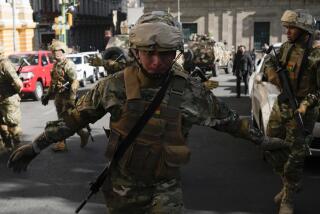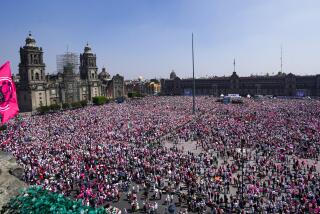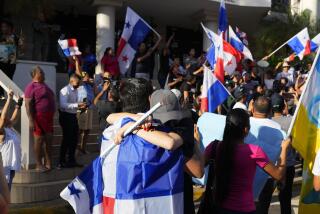Panama Renews Ban on Demonstrations : Military to Enforce Decree; Opposition Vows to Continue Protest
PANAMA CITY — The government of Panama reissued a ban on public demonstrations Thursday night and ordered the military to enforce it in the face of defiant anti-government protests.
The government also ordered all schools, public offices, and banks closed “to protect the citizens from groups of extremists that have prepared acts of violence.”
The ban and closures were announced on all of Panama’s television stations and followed a meeting of President Eric A. Delvalle with his Cabinet.
In several Panama City neighborhoods, protesters took to the streets immediately to clang on metal pots and honk automobile horns in apparent displeasure.
Opposition organizations grouped under the National Civic Crusade have been mounting frequent demonstrations to bring down the head of the Defense Forces, Gen. Manuel A. Noriega, the power behind Panama’s nominal civilian government. The crusade has defied a similar ban announced Tuesday by the government, and leaders say they will go into the streets for a scheduled demonstration today.
“We’re going to have the rally; it’s going to be peaceful, and if there is violence, we will hold Gen. Noriega and President Delvalle personally responsible,” said Gilberto Mallol, one of the crusade’s leaders.
The protesters now trying to bring down the government have posed the most serious challenge to military domination here in 19 years of de facto rule by officers of the Defense Forces, called the National Guard until 1983 and comprising all of the nation’s military and police organizations.
The turmoil presents the United States with a dilemma: Although many Reagan Administration officials would like to see Noriega out of power, they also fear that political instability would impair the smooth functioning of the strategic Panama Canal.
Over the years, Washington has tried to keep good relations with the Defense Forces, which get U.S. arms and training. By treaty, the United States is committed to turn full operational control of the canal and its defense over to Panama in the year 2000. Panama has held full sovereignty over the canal and the territory that used to be the Canal Zone and has had a key role in the canal’s operation since Oct. 1, 1979.
Members of the National Civic Crusade said that early Thursday evening U.S. Ambassador Arthur Davis warned them that violence could break out at an anti-government demonstration scheduled for today. The information, according to participants in the meeting, came to the embassy from a high-ranking member of the Defense Forces.
U.S. intelligence reports say that the Defense Forces are expected to deploy riot police and an elite unit trained originally for canal defense to cope with the demonstration.
The embassy’s deputy chief of mission, John Maisto, confirmed that embassy officials had warned the protesters about possible violence but declined to discuss Davis’ participation or say where the embassy obtained its information.
U.S. Role
Maisto also confirmed reports that U.S. officials tried to arrange a meeting between Noriega and opposition groups trying to depose him. The effort collapsed when crusade officials refused the invitation.
“We are not going to talk to the person we want to get rid of,” said Aurelio Barria, president of Panama’s Chamber of Commerce, one of a group of business and trade organizations that have banded together in the crusade.
U.S. Embassy officials visited leaders of anti-government civic groups Tuesday at the request of Noriega, opposition officials said Thursday.
No one would say what Noriega may have wanted to discuss with the opposition. According to reports circulating here, he is willing to overhaul the official Electoral Commission to allay fears that presidential elections scheduled for 1989 might be tampered with. A presidential election in 1984 was generally considered to have been won through fraud by Noriega’s hand-picked slate.
The opposition wants more than electoral guarantees. It demands that Noriega step down and that an independent commission be named to investigate election fraud charges as well as accusations of corruption and political assassination.
The government has made it clear that it fears an outbreak of violence.
On Sunday, Delvalle called for talks. One source said that Delvalle has promised that Noriega would step down after two or three months if talks get under way. The offer could not be confirmed.
Meddling Charged
The United States has been caught up in some of the street drama because of charges that Davis has been meddling in Panamanian affairs. Last month, pro-government demonstrators led by Panamanian officials stoned and threw paint at the embassy building in a protest against alleged U.S. interference.
Thursday, the embassy curtailed most of its normal operations for fear that anti-American demonstrations might erupt again.
More to Read
Sign up for Essential California
The most important California stories and recommendations in your inbox every morning.
You may occasionally receive promotional content from the Los Angeles Times.










